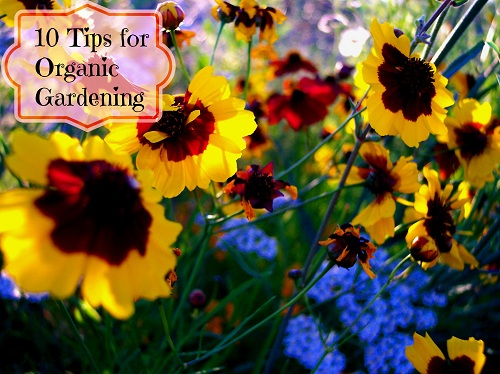Many people love to garden whether they are a flower gardener or an edible gardener. There are many relaxing qualities to gardening that that who don’t do it may never understand; Like what a stress reliever it is to rip out weeds when you’re mad. No matter what kind of gardener you are, or you aspire to be, choosing to be an organic gardener is healthier than using pesticides in your yard where your children or pets play, this is especially true if you are an edible gardener and you plan on consuming what you grow. Unfortunately, many don’t know what they can do to make their garden organic. These 10 tips are easy to implement and most are things that you can find right at home.
10 Tips for Organic Gardening
- Cucumbers have a photochemical in them that makes them perfect as an organic pesticide. To use cucumbers as a pesticide for your organic garden, slice thickly and place in a pie tin. Set the pie tin. Use more than one pie tin with cucumbers if you have a larger garden. Replace the cucumbers with fresh ones every few days.
- There are some trees that attract aphids no matter what you do with it. Aphids can kill a plant if too many gather on your roses, or other plants. To get rid of them, fill a spray bottle ¾ of the way full of water. Fill the rest of the way with apple cider or white vinegar. Spray your flowers or bushes thoroughly where the aphids are congregating. It is recommended that you spray your organic garden down at least twice a day.
- Instead of using bagged fertilizer that is full of harsh chemicals, help feed your garden from your compost heap. Banana peels, used coffee grounds, and fruit peels are fantastic fertilizers all on their own. Many people don’t like that it makes their organic garden look like an animal got into the garbage can, but if done properly, then you won’t even see your compost fertilizer under the leaves and flowers growing in the garden.
- Rely on the food chain to help control pests and creepy crawlies in your organic garden. Placing a bird bath close to the garden encourages birds to visit that will eat up some of your peskier bugs. Plant flowers and herbs with your vegetables to encourage predatory insects such as ladybugs and green lacewings. By mixing flowers, herbs, and vegetables together, you are also discouraging pest from whipping out an entire crop of target plants.
- Water wisely so that your organic garden doesn’t become soggy. Do the two knuckle test by sticking your finger into the soil two knuckles deep. If the soil still feels damp, don’t water the garden no matter what the plants look like. They will wilt during the hottest heat of the day, but perk back up once it cools off. It’s a plant’s defense mechanism. Water deeply so that your flowers and other plants don’t keep their roots close to the surface of the ground. This will result in a need for more watering in hotter weather.
- Don’t plant the same plants in the same area of the garden twice. Disease can linger in your soil and kill off your plants if you plant the same things over and over again. Move things around so that your soil stays healthy and your organic garden has a chance.
- To yield the largest amount of vegetables from your organic garden, don’t plant in square patterns or rows. Stagger your plants so that each plant has more growing room. Planting in a triangle can also give you additional room for more plants, just remember not to plant them too closely together or you could end up killing the whole crop.
- If you are planting in a raised garden, or planter boxes, use cedar wood to build your boxes and beds, cedar is a natural pest resistor and it will help rid your organic garden from some its many possible pests.
- Trim your plants frequently. When you remove the dead flowers, or clip off flowers for a bouquet, you are encouraging annuals to grow more abundantly. Your plants will look healthier and grow more flowers.
- Do everything you can to bring earthworms to your garden. These are a healthy creepy crawly that helps turn your soil and leaves worm castings behind. They increase air space in your soil so that your plants will grow healthier.
Overall, when it comes to organic gardening, there are many things that you can do to make the most of your time, space, and the plants you grow. Choosing to be organic is not only better for the environment, but it is better for those around your garden or that will eat from it.


Most enjoyable article and easy to follow, thank You